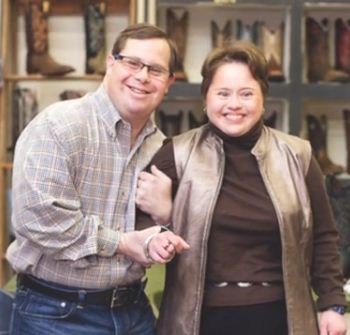Thirty years ago, two young tots met through their moms. They had one important thing in common: Both have Down syndrome. But they found a lot more that drew them together, and over the years, they fell in love. Now Austin Wayne Underwood and Jessica Smith are getting married this summer. The Texas couple is planning a Western-themed wedding, complete with custom-made cowboy boots. Yee-haw!
Jessica and Austin met when their mothers bonded over trying to mainstream their kids wherever they could. And it was thanks to their moms that Austin and Jessica are now getting to do what so many of us dream of and take for granted: get married!
But they can't do it alone. Couples with mental and developmental disabilities need a strong support network to help them with some very specific challenges. Here are 8 things that can help a special needs marriage like Jessica and Austin's flourish.

1. Focus on what's possible. "Not every person with Down syndrome will get married," says teacher Carol Heath, whose student Christi Hockel was one of the lucky ones who did. "But they can have a life that isn't all about their disabilities. It's about their abilities."
2. Remember what makes a marriage work: love, kindness, affection, clear communication. This is true for any couple, not just couples with Down syndrome.
3. Make sure your parents or guardians aren't too protective or invasive. Sometimes even parents who want to be supportive of your marriage have a hard time letting go and allowing you to have the independence you know you're capable of, according to Sarah Weir, vice president of advocacy for the National Down Syndrome Society. Be patient but be clear about your need for independence.
4. Even if you live on your own, remember that you'll still need outside support. This can come from your family, friends, caregivers, and other loved ones. Keep in touch regularly and set up routines so you can get the support you need.
5. Make sure your living arrangements will allow your marriage to flourish. Your home may need to be adapted for any physical challenges. And you may need some support for day-to-day needs. But you'll also need time alone together so your relationship can continue to grow.
6. As with any committed relationship or marriage, discuss your expectations with your partner (and your specialists). How do you feel about kids? What will you do if one of you becomes sick? Do you agree about finances? What about sex?
More from The Stir: World Down Syndrome Day Helps Show the Beauty in Something Many Fear
7. Be prepared for a host of outside health issues and other complications. People with Down syndrome may need extra support with any illnesses and conditions — like taking medication for diabetes or being able to get to doctor's visits, says Weir.
8. Understand how marriage affects your health-care benefits. "Financial and benefit barriers are two of the biggest challenges people with disabilities face," says Weir. Many special needs people get some sort of benefits to help with adaptive equipment, therapy, services, and day-to-day expenses. With the Supplemental Security Income (SSI) program, couples automatically get their benefits cut by a quarter, each, once they get married.
Something else to think about: getting involved in the bigger picture. Many special needs people and their families are urging legislators to pass the ABLE (Achieving a Better Life Experience) Act. This would help relieve people with disabilities of some of the marriage penalties they face.
We wish Austin and Jessica and other Down syndrome couples lucky enough to find each other and get married a lifetime of happiness, love, and laughter!
Do have any other advice for special needs couples like Jessica & Austin who are getting married?
Image via Anthony Kelly/Flickr




